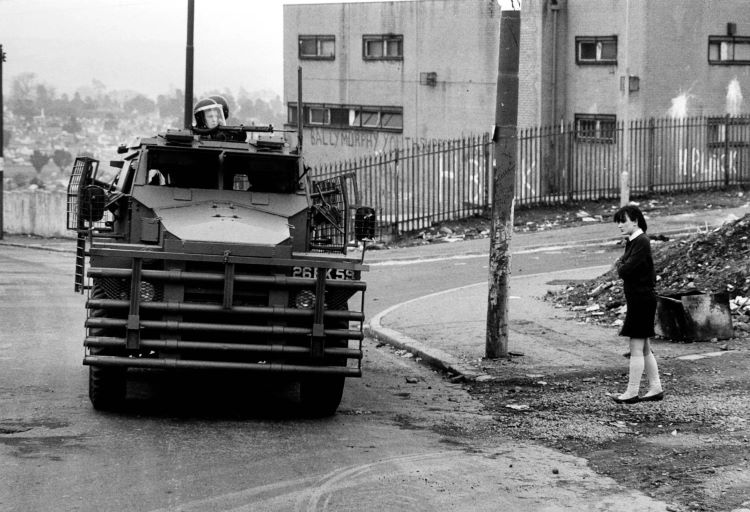Government Faces Backlash From Troubles Victims' Families Over Prosecutions "Amnesty"
5 min read
Brandon Lewis, the Secretary of State for Northern Ireland, today unveiled the government's controversial plan to block prosecutions of former soldiers and paramilitaries accused of crimes during The Troubles.
The government's long-awaited proposals, which Lewis announced to the House of Commons this afternoon, have prompted a backlash from relatives of victims of the conflict, as well as opposition from the Irish government.
Lewis confirmed the UK government intends to grant amnesty to former British soldiers and ex-loyalist and republican paramilitaries who are accused of committing crimes during the thirty year period of sectarian conflict.
Prime Minister Boris Johnson had been under intense pressure from Conservative MPs, including former defence minister Johnny Mercer, to fulfill a long-standing Tory manifesto pledge to stop "vexatious" legal cases against former British soldiers accused of commiting crimes in Northern Ireland.
However, as part of its plans, which Lewis admitted would be "difficult for some to accept," the government will also grant de facto amnesty to former republican and loyalist paramilitaries who are accused of committing crimes during The Troubles.
Johnson defended the proposals at Prime Minister's Questions before Lewis' statement.
Asked by Labour leader Keir Starmer how he can justify denying justice to the families of victims, Johnsons said the proposals claiming would allow the people of Northern Ireland to "draw a line" under the conflict, which resulted in the deaths of over 3,500 people.
"The people of Northern Ireland must, if we possibly can, move forwards now," the Prime Minister told MPs on Wednesday.
"The proposals being brought forward are measured, they are balanced, and they enjoy a wide degree of support from former Labour leaders and former Labour Prime Ministers who are of considerable more distinction than the right honorable gentleman.
"The sad fact remains that there are many members of the armed services who continue to face the threat of vexatious prosecutions well into their seventies and eighties, and we are finally bringing a solution to this problem."
However, Louise Haigh, the Shadow Secretary of State for Northern Ireland, said the plans were a betrayal of victims' families who were promised "proper investigations" into alleged crimes.
“This Government gave victims their word – they would deliver the proper investigations denied to victims and their families for so long," Haigh said in response to the proposals.
"To tear up that pledge would be insulting, and to do so without the faintest hint of consultation with those who lost loved ones would be staggeringly insensitive.
"The Prime Minister should look victims’ families in the eye, and explain why he wants to close the book on their cases, and why they have been the last to be told about these proposals?”
 During Prime Minister's Questions Starmer quoted a scathing letter to Johnson by Julie Hambleton, whose sister Maxine was murdered in the 1974 Birmingham pub bombing.
During Prime Minister's Questions Starmer quoted a scathing letter to Johnson by Julie Hambleton, whose sister Maxine was murdered in the 1974 Birmingham pub bombing.
"At what point did your government lose all sight of its moral, ethical and judicial backbone?," she asked.
"Can you imagine how many more innocent souls the IRA would have murdered if they had known that in the future, no matter how many thousands they killed and injured, it would not matter because they would be pardoned, granted an amnesty and let off Scot free?"
Kathleen Gillespie, whose husband was murdered by the IRA in 1990, said she felt "robbed" by the government's proposals. "The people who murdered my husband are still walking free. I could be walking past them up the town any day and not know who it was," she told Sky News.
The government argues prosecutions relating to The Troubles are increasingly difficult due to the passage of time and that in the vast majority of cases they will never be successful.
As well as closing down prosecutions, it is setting up a new independent body that will gather information on alleged historic crimes with the aim of establishing the truth for relatives of victims.
The decision to eliminate the option of prosecution was opposed by the five main political parties in Northern Ireland. Speaking in the House of Commons, DUP leader Jeffrey Donaldson told Lewis: “I cannot believe the path to reconciliation is made easier when we sacrifice justice.”
Government sources stressed the proposals were not final and that the government would consult the Irish government, political parties in Northern Ireland, and victims groups about how they could be improved before putting them into legislation later this year.
However, they made clear that while they were open to ideas for how the sensitive issue of legacy can be addressed, they had not yet heard a better alternative.
The Irish government on Wednesday morning said any plan for dealing with legacy issues had to be agreed with Dublin and parties in Northern Ireland.
Simon Coveney, Ireland's foreign minister, tweeted the UK government's proposals were "not a fait accompli" and that Dublin takes a different view to on how legacy issues should be addressed.
